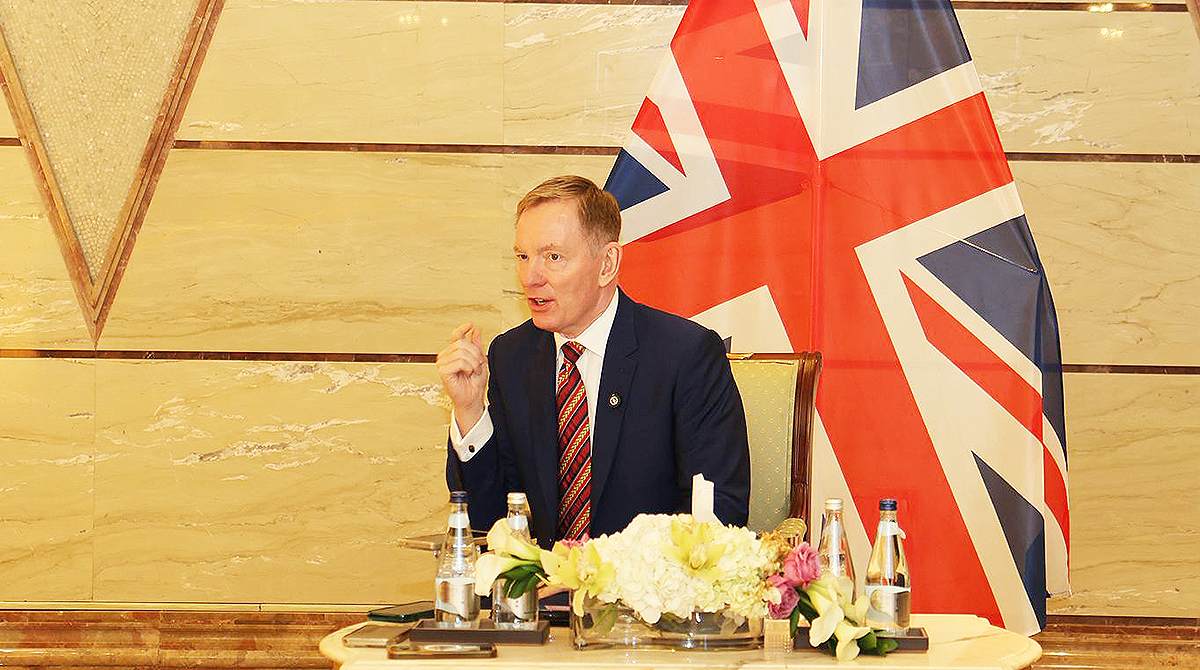29/10/2025
29/10/2025

KUWAIT CITY, Oct 29: British Trade Minister Chris Bryant expressed his deep appreciation for Kuwait’s hospitality and stability, describing his first visit to the country as “a great pleasure” and commending Kuwait as one of the most stable and dynamic regions in the world.
Speaking at a press conference with local media during his official visit, Bryant emphasized that the primary goal of his trip is to enhance and expand trade cooperation between the United Kingdom and Kuwait, noting that the two nations share a rich history of commercial ties.
“Many people in the Gulf have been doing business with the United Kingdom for years, even decades and centuries,” Bryant said. “We want to build on this strong legacy and finalize the free trade agreement (FTA) with the GCC countries as soon as possible.”
The minister revealed that discussions between the UK and Gulf states have been extensive and productive, describing them as “perhaps the longest and most positive rounds of ministerial talks so far.” He expressed optimism that a comprehensive free trade agreement could be signed and finalized “within the coming weeks, or at least very soon.”
Investment and Market Liberalization
Bryant highlighted the deep investment links between Kuwait and the UK, noting that Kuwaiti investments have long contributed to Britain’s economic strength.
“Kuwait has historically invested heavily in the UK, and one could argue that the strength of the British stock market today is partly due to Kuwaiti and other Gulf investments,” he said. “These have always been safe and reliable — whether in infrastructure, football clubs, or major financial sectors.”
He also announced the establishment of a multi-billion-pound fund under the UK Export Finance framework to support British exporters seeking to invest across the Gulf.
“Our goal through the free trade agreement is to liberalize markets as much as possible, making trade easier and more dynamic,” Bryant added. “Signing an agreement is the easy part — what truly matters is how effectively it is implemented by business communities on both sides to achieve shared economic prosperity.”
Kuwait Vision 2035 and Economic Diversification
When asked about the FTA’s alignment with Kuwait Vision 2035, Bryant reaffirmed the UK’s commitment to supporting Kuwait’s diversification efforts.
“It’s clear that any country depending on a single industry faces risks of economic shocks,” he said. “Kuwait is already moving toward diversification, and we are ready to support that transformation. This agreement will help by reducing customs barriers and broadening trade beyond traditional sectors such as oil and gas.”
The minister clarified that the proposed FTA would cover a wide range of sectors, including energy, metals, industrial goods, and new technology-driven industries, creating broader opportunities for collaboration.
Focus of the Talks and Outlook
Commenting on the ongoing discussions with Kuwaiti officials, Bryant said the talks were centered on the free trade agreement and its practical roadmap.
“If we can sign the agreement within the next five or six weeks, 2026 will be the year of real work — ensuring that the agreement is implemented and actually used,” he explained. “Signing it is not enough; activation and execution are what truly matter.”
Bryant added that the UK places great value on its historic and trusted relationship with Kuwait and the Gulf region.
“I met many ministers today who know the UK very well, and there is a strong sense of mutual trust — that trust is our foundation for moving forward,” he said.
Concluding his remarks, the minister reflected on the UK’s post-Brexit trade landscape:
“It’s true that leaving the European Union came with both challenges and opportunities. One of the key advantages is our ability to sign independent trade agreements, but we also recognize the need to strengthen our own agreement with the EU.”
Bryant’s visit underscores the United Kingdom’s growing interest in deepening trade and investment partnerships across the Gulf, with Kuwait serving as a key pillar in that strategic vision.


